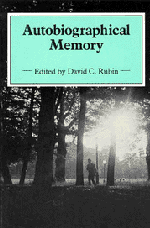Book contents
- Frontmatter
- Contents
- List of contributors
- Preface
- Part I Overview
- Part II Historical, theoretical, and methodological contexts for the study of autobiographical memory
- 2 Autobiographical memory: a historical prologue
- 3 What is autobiographical memory?
- 4 Ways of searching and the contents of memory
- Part III The general organization of autobiographical memory
- Part IV The temporal organization of autobiographical memory
- Part V Temporal distributions of autobiographical memories
- Part VI Failures of autobiographical memory
- Author index
- Subject index
3 - What is autobiographical memory?
Published online by Cambridge University Press: 01 March 2011
- Frontmatter
- Contents
- List of contributors
- Preface
- Part I Overview
- Part II Historical, theoretical, and methodological contexts for the study of autobiographical memory
- 2 Autobiographical memory: a historical prologue
- 3 What is autobiographical memory?
- 4 Ways of searching and the contents of memory
- Part III The general organization of autobiographical memory
- Part IV The temporal organization of autobiographical memory
- Part V Temporal distributions of autobiographical memories
- Part VI Failures of autobiographical memory
- Author index
- Subject index
Summary
The purpose of this chapter is (a) to describe the forms of autobiographical memory and contrast them with other forms of memory; (b) to give a theoretical account of autobiographical memory in terms of the self; (c) to argue for the importance of phenomenal reports in the study of autobiographical memory; (d) to examine some of the experimental findings on autobiographical memory in the context of this analysis; (e) to give a detailed account of personal memory, one of the important forms of autobiographical memory; and (f) to outline a partially reconstructive view of personal memory.
The problem
The study of autobiographical memory is one of the least well-developed areas in the study of human memory; there is considerable divergence both in what is being investigated and in the terminology used to describe what is being investigated. There is still much work to be done in describing and classifying the basic phenomena in the area. In order to gain an immediate impression of the complexities involved in studying this topic, I want to examine a concrete example. Currently the most popular technique for studying autobiographical memory is a method developed by Sir Francis Galton (1879a, 1879b) in which the subject is presented with a word and asked to find a memory related to that word. This simple task nicely reveals one of the major problems that will be addressed in this chapter – the multiple forms of autobiographical and non-autobiographical memory.
Information
- Type
- Chapter
- Information
- Autobiographical Memory , pp. 25 - 49Publisher: Cambridge University PressPrint publication year: 1986
Accessibility standard: Unknown
Why this information is here
This section outlines the accessibility features of this content - including support for screen readers, full keyboard navigation and high-contrast display options. This may not be relevant for you.Accessibility Information
- 365
- Cited by
